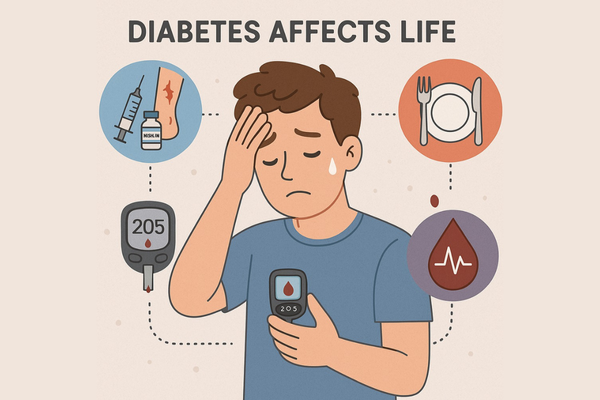How Does Diabetes Affect Life?

Diabetes is a chronic condition that affects millions of people worldwide. Whether it's type 1, type 2, or gestational diabetes, this condition has a significant impact on daily life, both physically and emotionally. Living with diabetes means constantly managing blood sugar levels, making lifestyle adjustments, and dealing with potential complications. In this blog, we’ll explore how diabetes affects different aspects of life and what can be done to live well with it.
Understanding Diabetes
Diabetes occurs when the body either doesn't produce enough insulin or can't effectively use the insulin it produces. Insulin is a hormone that regulates blood sugar. Without it, glucose builds up in the blood, leading to high blood sugar levels. The most common types are:
- Type 1 Diabetes: An autoimmune condition where the body attacks insulin-producing cells.
- Type 2 Diabetes: Often related to lifestyle, where the body becomes resistant to insulin or doesn’t produce enough.
- Gestational Diabetes: Develops during pregnancy and usually resolves after childbirth.
Physical Impact of Diabetes
1. Energy and Fatigue
People with diabetes often experience fatigue due to fluctuating blood sugar levels. High or low glucose levels can sap energy and make daily tasks feel exhausting.
2. Vision Problems
Diabetes can lead to diabetic retinopathy, cataracts, and even blindness if blood sugar is not controlled.
3. Nerve Damage
Known as diabetic neuropathy, this can cause numbness, tingling, or pain, usually in the hands and feet.
4. Kidney Damage
FDiabetes is a leading cause of kidney disease. High blood sugar damages the filtering units in the kidneys over time.
5. Cardiovascular Risk
Diabetics are at higher risk of heart attack, stroke, and hypertension due to blood vessel damage.
Lifestyle Adjustments
1. Diet and Nutrition
Managing diabetes requires a balanced diet rich in fiber, whole grains, lean proteins, and healthy fats. Sugary snacks, refined carbs, and processed foods need to be limited or avoided.
2. Regular Exercise
Exercise helps regulate blood sugar and maintain a healthy weight. It also improves insulin sensitivity.
3. Medication Management
Many diabetics take insulin or other medications. Remembering to take them regularly and monitoring blood sugar is crucial.
4. Stress Management
Stress can spike blood sugar levels. Meditation, yoga, and breathing exercises help manage it.
5. Sleep Patterns
Poor sleep can worsen insulin resistance and increase cravings for sugary food, making diabetes harder to manage.
Emotional and Social Effects
Living with diabetes can be emotionally taxing. There may be feelings of frustration, fear, or even guilt over blood sugar levels.
1. Mental Health
Depression and anxiety are more common in people with diabetes. It’s important to seek support.
2. Social Life
Diet restrictions and frequent monitoring can make social gatherings and travel more challenging.
3. Work and Productivity
Fatigue, medication schedules, or low blood sugar episodes can affect concentration and job performance.
Diabetes in Different Life Stages
Diet restrictions and frequent monitoring can make social gatherings and travel more challenging.
- Children and Teens: Type 1 is more common. Requires support in school and emotional counseling.
- Adults: Type 2 is more prevalent. Management is key to avoiding complications.
- Pregnancy: Gestational diabetes affects both mother and baby. Proper control is crucial.
- Seniors: Complications are more likely. Regular check-ups and eye/foot care are essential.
Preventing Complications
- Monitor blood sugar regularly
- Stick to treatment plans
- Regularly visit doctors, optometrists, and podiatrists
- Keep blood pressure and cholesterol in check
Living Well with Diabetes
Diabetes doesn’t have to define your life. With the right care, support, and mindset, people with diabetes can lead healthy, fulfilling lives. Community support groups, apps, dieticians, and diabetes educators can provide extra guidance.
Conclusion
Diabetes affects life in many ways, from daily routines and diet to long-term health and emotional well- being. But with awareness, regular care, and a proactive approach, it is absolutely possible to thrive while living with diabetes.

